In Conversation with Geshe Lhakdor
Article By Yaron Barzilay
posted by Harianto Mehta, October 7, 2015
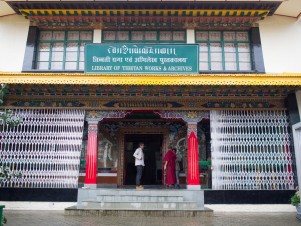 During their grueling journey across the Himalayas, Tibetan refugees carried hundreds of manuscripts into India, often guarding them with their lives. Many of these precious texts were offered to His Holiness the Dalai Lama, who founded the Library of Tibetan Works and Archives in Dharamsala (India), dedicated to preserve and promote the Tibetan heritage. Today it is internationally recognized by Tibetan scholars as a pre-eminent education center, specialized in Language, Philosophy, Culture, Translation, and Science. It houses numerous manuscripts, hundreds of thangka scrolls, and a variety of artifacts in its museum.
During their grueling journey across the Himalayas, Tibetan refugees carried hundreds of manuscripts into India, often guarding them with their lives. Many of these precious texts were offered to His Holiness the Dalai Lama, who founded the Library of Tibetan Works and Archives in Dharamsala (India), dedicated to preserve and promote the Tibetan heritage. Today it is internationally recognized by Tibetan scholars as a pre-eminent education center, specialized in Language, Philosophy, Culture, Translation, and Science. It houses numerous manuscripts, hundreds of thangka scrolls, and a variety of artifacts in its museum.
In August 2015, Yaron Barzilay (Director of New Acropolis Cultural Organization India – North) met with Geshe Lhakdor, Director of the Library, as well as the Central Archive of His Holiness the Dalai Lama. Geshe translates as ‘virtuous friend’ and is a rigorous Tibetan Buddhist academic degree for monks and nuns. Here are excerpts from their conversation.
Yaron Barzilay: Can you share a little bit about your personal journey so far?
Geshe Lhakdor: I was born in Tibet. When I was young I escaped to India and went to regular school. After I finished my 11th class, I joined the Institute for Buddhist Dialectics in Dharamsala to study this philosophy. I studied here for 13 years. Then I went to South India to finish my Doctorate of Divinity. I worked at the Tibetan House in New Delhi and two and a half years later I was invited to join His Holiness the Dalai Lama’s office. I worked for sixteen years as his translator, travelling to many places. In 2005 I became the director of this Institute.
YB: I understand you are also a trustee for The Foundation of Universal Responsibility of His Holiness the Dalai Lama. From that perspective, how do you see the current scenario in the world?
GL: According to Buddhist teaching, it’s very easy; one of the most fundamental teachings is “May all sentient beings be happy.” It is even beyond human beings. All sentient beings! That’s the Buddhist prayer. Much bigger than globalization, it is an even more universal attitude, which includes birds, animals, everything. But the most important concept within that is inter-dependent origination [sic]; nations have to work together, people have to work together, and we have to live in harmony with the environment.
YB: Would you describe the current world scenario as positive?
GL: Basically, I would say it is positive. But there are many that don’t want change, who say ‘My religion is best’ and not only that but, ‘we should destroy all other religions’. This is really terrible, but it is reality.
However, at least today we are talking about globalization, protecting the environment, human rights, rights of women. You see, those things were never discussed before, whether there was no need, or no awareness, whatever the case. Today we are compelled to pay attention to these things.
YB: There is definitely more need. But the question is whether world leaders are responding to this need. Are we living in a world that nurtures spiritual needs? Or is it a world that is more materialistic?
GL: I do not want to give you a pessimistic picture…
YB: No, a realistic one…
GL: …but at the same time, what world leaders are doing, is far from enough. As you can see, the majority of world leaders are concerned with business, because the possibility of them remaining as leaders is very dependent on the business community. And because of their money, businesses have a lot of say. There was a time when the world was ruled by army generals…now rich people rule the world. Therefore all leaders fall in line with the rich and whenever there is a possibility to do business, you close your eyes to human rights. It’s happening and it’s very sad. So long as you have an economic benefit you keep your mouth shut. When your need is in jeopardy, then you start shouting. That’s not good. And ordinary people can’t do much about this.
But pessimism is not a solution. We must hope for the best. Future Presidents and Prime Ministers will come from among ordinary people. So as you rightly mentioned, we need to come up with a philosophy based on which we nurture young people who care for these values, so that we can hope to get good leaders who don’t only think about money but who also think about the quality of human life.
YB: We spoke earlier about the importance of preservation. How do you strike a balance between preserving the past, and the ability to adapt in a constantly changing world?
GL: When you talk about preservation or conservation, we talk about preserving what is there already. When you talk about adaptation, it’s a whole new way of seeing things. It’s a totally new emerging concept. All texts have proper lineage coming from the Buddha. You cannot just make one text. Philosophical treatises have been thoughtfully written and many of these texts have been based on personal experience and meditation. This is change and adaptation. Of course many Buddhist teachings are perennial teachings. They are everlasting. So even with change, they do not change. For example, the teaching of Impermanence; Impermanence itself means change. The concept is already there.
YB: You mean that there are eternal principles.
GL: Yes. And they don’t need to change.
YB: But the forms, through which these eternal principles manifest, can change?
GL: The way you explain to people, the examples you give, may have to change.
YB: For example, your use of English.
GL: Exactly, for people who speak English it is easier for them to understand. Also, if you are able to explain the Buddhist teachings with recent scientific findings; that will help people develop conviction. The end purpose is that through this we can help them improve physical and mental health. Everybody needs good mental health.
YB: It’s more important than the physical.
GL: Much more important. And the mental health of the people in the world is not so good.
YB: To many, Tibet is synonymous with wisdom. From a purely philosophical point of view, do you have any advice for those interested in the wisdom of Tibetan Buddhism, beyond its religious aspects?
GL: Without making it complicated, without making it just a religious issue, the core of this philosophy basically says, ‘Live in harmony with nature.’ If you look at nature, which includes you and me, you will flourish only if you are in harmony with yourself. If your mind and body is in harmony, you will be healthy. Likewise if you are in harmony with the people you live with, you will prosper. Similarly if your nation is in harmony with other nations, with the environment, then you will develop and flourish. That’s the law of nature.
The philosophy that Buddha taught is not something he invented. It is something that he discovered. It is there in you, and in me, but we are not paying attention. And the Buddha said, ‘Pay attention…the law of nature is impermanence…you are going to change…you are going to die.’ But we don’t want to pay attention to this. We want to live forever, buy a big fancy home, buy a big fancy car. To summarize, we should have the right, correct mental perspective, which is true to the way things are. Then you will be happy. If you say one thing and do something else, it’s not harmony. You are asking for problems. Understand the law of nature; cultivate an unbiased mental perspective, then you will be happy.
The need to achieve the highest happiness through religious practice is the most important issue for all. Whether you believe in religion, or you are anti-religion…it doesn’t matter. We all want happiness. But how are we going to get it? The Buddha said you are not going to get it from the outside; your parents, your relatives, your fancy car, your money – they will give you some comfort, a little happiness, but not ultimate happiness. At the end of the day, if you really want long lasting peace, it has to come from within yourself. So you must cultivate the right mental perspective, which will not be disturbed or shaken by changing situations and events. And if you don’t have that perspective, if you just run after changing situations and events, then your happiness is dependent on external circumstances and you will never be happy.
And more importantly, that which makes you narrow minded, sectarian, and biased, are the negative emotions within yourself. Anger, jealousy, hatred…these negative emotions restrict and constrict your life. They will suffocate you. So get rid of them and you will be free. The Buddha says, the real enemy is not outside, it is inside yourself. Recognize this.
His Holiness the Dalai Lama summarizes this point by saying that Buddhist philosophy states that you should understand the interconnected reality. The reason you should love others and be compassionate to others is because we are all interconnected. How can you be mean and negative to those on whom you are dependent? If you destroy the environment, you will be the one to suffer. It’s as clear as that.
YB: This is the credo of stoic philosophers, Aristotle and Plato. It is a simple truth. We live in a seemingly educated world today, and most people will agree with what you say. Yet people don’t act in accordance. Why is that? If they did, the world would be a different place.
GL: Because we are like small kids. We think we are grown up. As you said we are educated. Yes, to some extent. We are professors, scientists, etc. But on another level still we are like small kids who only want to play with their toys as if that’s everything. Similarly, to those who are enlightened like the Buddha, we are like very small kids – fighting with each other and completely distracted by smaller, meaningless things. There is no time to think about bigger issues. And people who have the time, and some knowledge, are unable to practice it because their whole way of life is habituated to something else. Die-hard habits are difficult to throw away, and in many cases are addictions.
YB: So the challenge is the ability to live in accordance to what we understand as right?
GL: Exactly. There is a process. And Buddhist texts very clearly say that the scripture is like a mirror. When you look at a mirror, if you find a dark spot, you have to remove it. If you just look at the mirror and see the dark spot, and don’t do anything, what is the use of looking in that mirror? Similarly, when the text says compassion is good, you must ask, ‘Do I have it?’ And if I don’t, I must activate it. Anger is bad. ‘Do I have anger?’ ‘Yes, I have anger. I must remove it.’ Just like removing the dark spot. That’s the process. But normally we just look at the mirror and don’t do anything. We are all sailing in the same boat. The majority of us have no knowledge. Many have knowledge, but no practice. That’s the problem.
YB: I’ve read many stories of western explorers who set off on the arduous journey to look for the mystical land of Tibet…
GL: A Shangri-La.
YB: And for centuries it was forbidden for foreigners to even enter Tibet?
GL: Yes. Yes. Every government has their rules and regulations.
YB: And if I may say so, Tibet is in a completely different place today than it was a hundred years ago. Is there some meaning in this?
GL: That is what I have been telling you. If you go against nature, sooner or later you will be the loser. Tibetans closing themselves is almost like going against nature. Because the rest of the world was developing, making scientific, technological advances. But Tibetans thought that they had enough. They were at peace and content. But because of no contact there was no modernization, no science, no technology. So China could very easily come in and trample them. You cannot remain happy in your own cocoon, without seeing what is outside. That is the Buddha’s teaching. Look at nature, reality, it’s important.
So some people have said Buddhism is pessimistic. But I tell them Buddhism is realistic. But the people practicing Buddhism are not realistic. That’s the problem. There is a gap between the teaching and the practitioners.
YB: Realistic by definition is also positive?
GL: Of course. Positive. Reality is something you have to accept. That’s why the Buddha was talking about sickness, suffering, and death. This is realistic. So not only in the teaching hall, but also in your life, you have to have an open mind, ready to accept reality and not confine yourself to one small thing and say, “This is the best.” How can you say my religion is best when you don’t know anything about another religion? You need to learn even from those philosophies that are not argumentally sound, because the Buddhist teachings say that the lower philosophical thoughts are like steps to climb towards the higher thoughts. If you don’t know where you are making a mistake, how will you reach the place where there are no mistakes? It is important to open up, and listen, and talk to other people. This did not happen.
YB: Do you see a role for the philosophy of Tibetan Buddhism in the world today?
GL: The most important key is to develop compassion towards everybody. But human beings are human beings. How many people are really able to practice this? It’s not easy because as human beings you have faults and foibles. You say something; I get angry, my compassion disappears. It is not easy, but the desired goal is to see everybody in the same light, including even the tiniest insect.
It’s out of madness due to negative emotions that we are harming each other, obstructing each other, and there is no peace. Look at the so-called Big Powers who have become big and powerful because of the arms that they have stock piled. Arms and ammunition for killing people, and still we say “intelligent” human beings? We are at the stage where nobody can stop. You know what happened in Hiroshima and Nagasaki, and today it’s much more powerful than that. So we need wisdom.
YB: I agree.
GL: We need your philosophy.
YB: We need your philosophy.
GL: With just a little common sense, the world will be fine, even if you don’t know the very subtle structure of the nucleus of the atom. In ancient times, people didn’t know about these things and yet lived harmoniously. That’s why when some very important questions were asked to the Buddha, like ‘Is there a beginning to the universe?’ and ‘Is there life hereafter?’ he did not reply.
You see, you need not have an answer to every question. A starving man does not need a five star feast; he just needs something to eat. Today’s situation is like that. If you get deep philosophy – that’s good. But if you don’t – at least there should be common sense. But are we able to practice it? That is the problem.
YB: I agree. It is an intellectual way of living.
GL: Yes. And the most important teaching in Buddhism says that even if the whole world is turbulent, you should be in peace.
YB: Like the Stoics who said, “You need to be like a rock in stormy waters.”
GL: Exactly. Just like that.
———-
Compiled by: Manjula Nanavati
Image Credits: Image Courtesy : New Acropolis, Image Courtesy: Library of Tibetan Works and Archives, Image Courtesy: Library of Tibetan Works and Archives
Related posts:
Image References
Image Courtesy : New Acropolis
Permissions required for the publishing of this article have been obtained
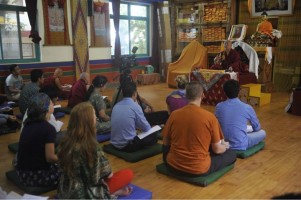
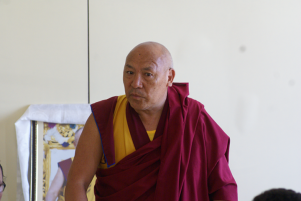
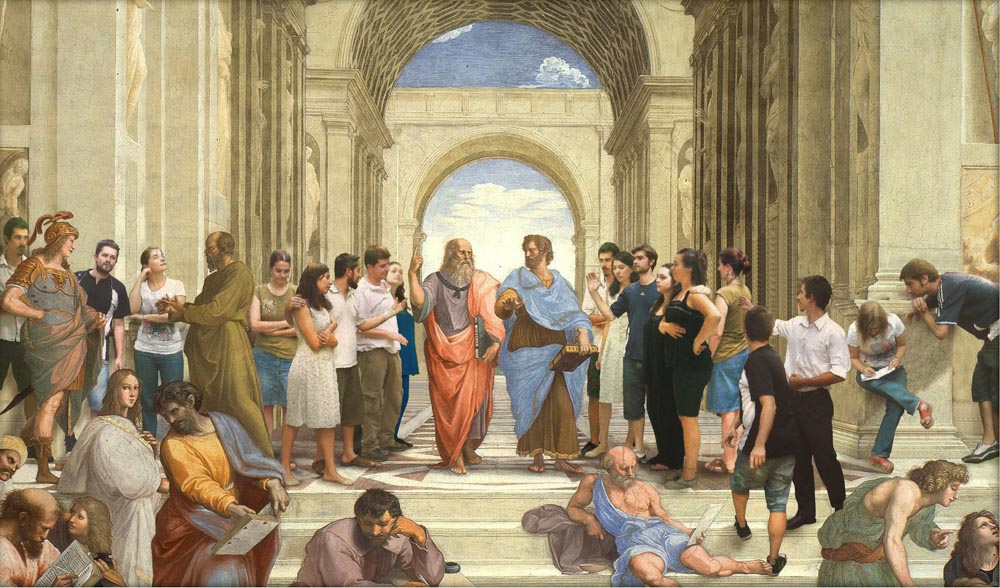

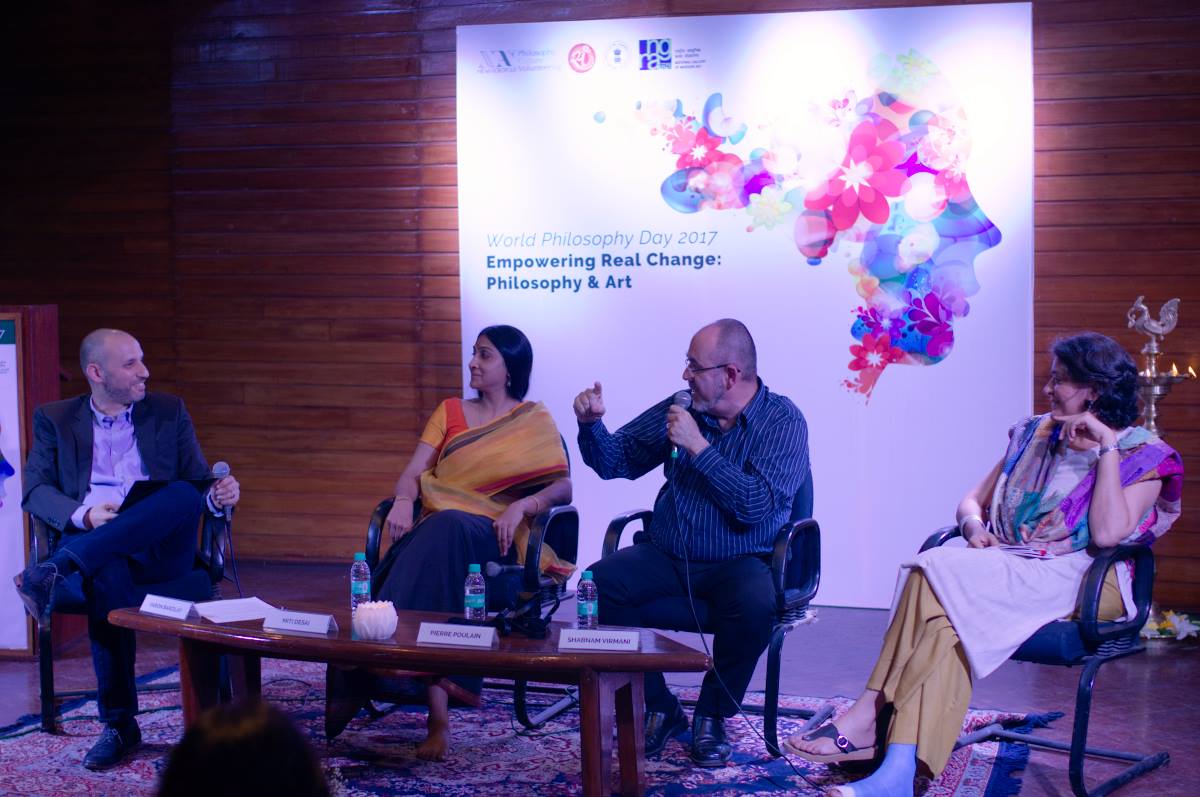

What do you think?